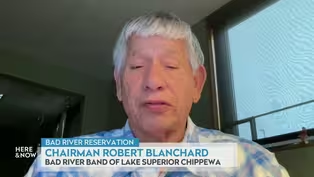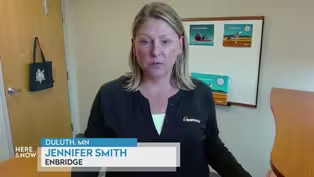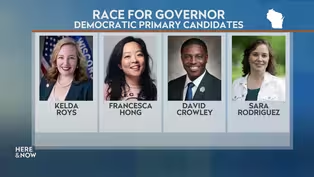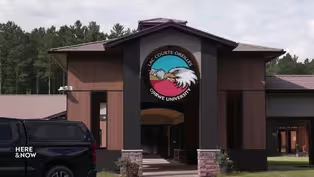Here and Now
The Politics of Remote Work and Wisconsin State Employees
Clip: Season 2400 Episode 2411 | 5m 15sVideo has Closed Captions
A bill seeks to halt most remote work practices for state employees in Wisconsin.
A bill before the Wisconsin Legislature seeks to halt most remote work practices for state employees and require in-office work, even as state government moves toward reducing office building costs.
Problems playing video? | Closed Captioning Feedback
Problems playing video? | Closed Captioning Feedback
Here and Now is a local public television program presented by PBS Wisconsin
Here and Now
The Politics of Remote Work and Wisconsin State Employees
Clip: Season 2400 Episode 2411 | 5m 15sVideo has Closed Captions
A bill before the Wisconsin Legislature seeks to halt most remote work practices for state employees and require in-office work, even as state government moves toward reducing office building costs.
Problems playing video? | Closed Captioning Feedback
How to Watch Here and Now
Here and Now is available to stream on pbs.org and the free PBS App, available on iPhone, Apple TV, Android TV, Android smartphones, Amazon Fire TV, Amazon Fire Tablet, Roku, Samsung Smart TV, and Vizio.
Providing Support for PBS.org
Learn Moreabout PBS online sponsorshipCrowley and Lieutenant Governor Sarah Rodriguez in other state government news.
A political debate is brewing at the Capitol over whether state employees remotely or be required to return to the office.
Here and now reporter Steven Potter has details.
>> We want to get the most out of our state workforce, and this should have been done a long time ago.
>> State Representative Amanda Nedweski is pushing for big changes to how, or more importantly, where state employees work.
>> The Return to Work bill simply requires state employees who worked inside an office building for the state prior to March 1st of 2020 to come back and work in person.
from Pleasant Prairie has several reasons why she thinks state employees should be working in state office buildings instead of at home.
>> It's been five years since this temporary solution to the Covid response was instituted.
to evaluate productivity outside of the office.
So it just sort of was we're all going to go home and work remotely, and no one ever has to come back.
It's become sort of a permanent solution to what was a temporary problem.
Assembly debated and ultimately passed Nedweski bill, with all Republicans voting for it and all Democrats voting against it.
>> As amended.
It requires most state employees to be in the office at least 80% of the work month, roughly four days a week, allowing for some flexibility.
>> Nedweski says she wrote the Return to Work bill to rein in a state government remote work system that lacks proper oversight of its employees.
>> People are very concerned about efficiency, fiscal management or mismanagement and fraud.
And I'm you know, this is an accountability issue.
>> And she says her constituents are asking for this bill.
of your taxes.
If you know, if you're a teacher or a nurse, or maybe you're a small business owner, the system.
You want to know you're getting the most you can out of it.
And that's that's what we're hearing from constituents >> Representative Mike Beyer, a Democrat from Verona, says he's hearing very different things from his constituents.
>> And I have not heard from one single constituent, one single state worker who thinks this bill is a good idea.
We heard over and over from from the state government, from secretaries and managers and state government that they don't need this bill.
What they've been doing is working.
effective, which is why it's still in place so many years after the pandemic began.
suggest that this would be helpful to state workers, that this would be helpful to our state government.
No evidence to suggest that this would save any money or make us more efficient.
In fact, it will cost more money and make us more inefficient.
>> To that point of cost, if this bill becomes law, finding office space for state employees to return to would be a challenge.
Over the last few years, many state agencies have realized savings in rent and building maintenance by shrinking or even eliminating their needs for physical office space.
In fact, the state is currently emptying and getting ready to sell three of its largest office buildings in downtown Madison.
bill at the time I introduced it was something like 200 to $400 million to bring employees back because they've closed buildings without evaluating telework performance.
>> Representative Beyer allowed many state employees to move away from the state's larger cities, a benefit they appreciate.
>> They've moved out into the state, across the state, out into assembly districts that aren't as close to Madison as mine is.
So that means that those workers will have to come back, and that has a tremendous cost to it in the hundreds of millions of dollars.
>> Both lawmakers note that cybersecurity issues for remote working state employees is a concern that needs to be addressed.
Beyer and Nedweski also agree that ending or limiting remote work for state employees will have a significant effect on hiring and retention.
>> There would be a bleed of good, talented, skilled people from state want to see.
>> Well, I expect there'd be some turnover.
>> In all.
There are about 70,000 employees working for various state agencies and the universities of Wisconsin system.
Estimates range that from 19 to 75% of those employees work remotely or have hybrid work schedules, depending on the agency.
Representative Nedweski mandate that all state employees can work remotely.
Again.
you have to come back, reevaluate, and if you it's determined by your business unit or by your department that you've been working work situation, you can reengage in a remote work agreement.
however, says offering public employees remote or hybrid work options keeps the state competitive in the job market.
>> I don't think that this is special treatment.
I think this is treatment that's consistent with what the private market is doing.
And and I think that managers have been holding them accountable for being who are working for the taxpayers as they're expected to do.
>> While the Republican majority in the Assembly passed the bill last week, it must still go to the Senate.
And if approved by the Republican majority there, it will go to the desk of Democratic Governor Tony Evers, who will almost
Adam Kunz on College Students and Civil Political Discussion
Video has Closed Captions
Clip: S2400 Ep2411 | 6m 23s | Adam Kunz on efforts to bring together college students to discuss polarizing issues. (6m 23s)
Chairman Robert Blanchard on Challenging Line 5 Rerouting
Video has Closed Captions
Clip: S2400 Ep2411 | 6m 2s | Robert Blanchard on challenges to permits for a reroute of the Enbridge Line 5 pipeline. (6m 2s)
Evers Order Requires COVID Vaccine Coverage in Wisconsin
Video has Closed Captions
Clip: S2400 Ep2411 | 1m 7s | Ryan Westergaard on an order requiring insurance to cover access to COVID-19 vaccine. (1m 7s)
Here & Now opening for September 19, 2025
Video has Closed Captions
Clip: S2400 Ep2411 | 1m 13s | The introduction to the September 19, 2025 episode of Here & Now. (1m 13s)
Jennifer Smith on Enbridge's Proposal For Rerouting Line 5
Video has Closed Captions
Clip: S2400 Ep2411 | 4m 55s | Jennifer Smith on Enbridge's plans to reroute its Line 5 pipeline around tribal lands. (4m 55s)
More Democrats Enter Wisconsin's 2026 Gubernatorial Primary
Video has Closed Captions
Clip: S2400 Ep2411 | 26s | State Sen. Kelda Roys and state Rep. Francesca Hong enter the 2026 governor's race. (26s)
Tribal Colleges To Get One-Time $108 Million Federal Boost
Video has Closed Captions
Clip: S2400 Ep2411 | 38s | The Department of Education announced tribal colleges will get a one-time funding boost. (38s)
Providing Support for PBS.org
Learn Moreabout PBS online sponsorship
- News and Public Affairs

Top journalists deliver compelling original analysis of the hour's headlines.

- News and Public Affairs

FRONTLINE is investigative journalism that questions, explains and changes our world.












Support for PBS provided by:
Here and Now is a local public television program presented by PBS Wisconsin






